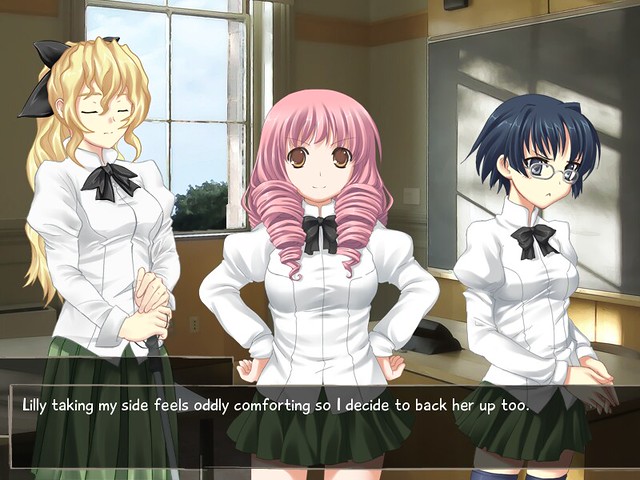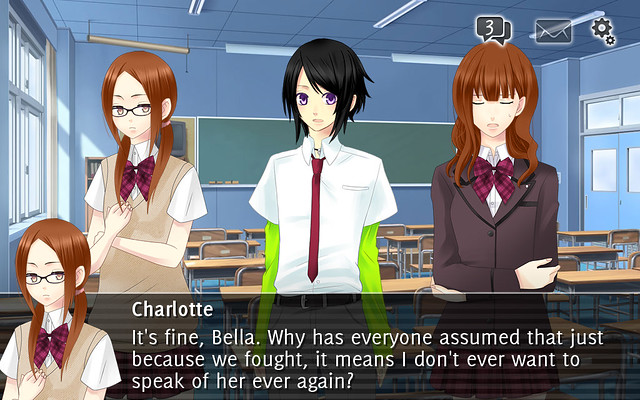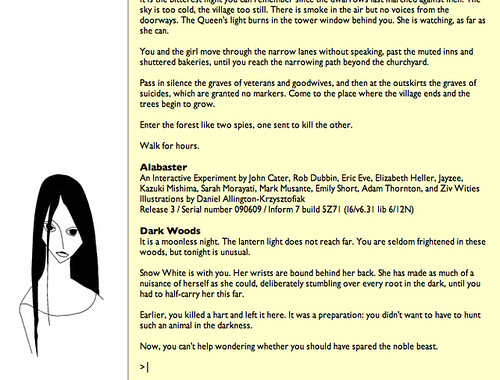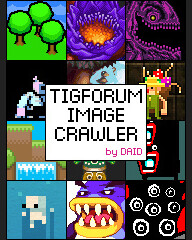Posts from ‘Interactive Fiction’ Category
Hadean Lands
By: Derek Yu
On: December 1st, 2014
Andrew “Zarf” Plotkin is a well-known and influential figure in interactive fiction – on top of penning classic IF games like Spider & Web and Shade, he also developed the Blorb package format, Glx API, and Glulx virtual machine for making and playing them. His latest game, Hadean Lands, is four years in the making (following a successful Kickstarter) and is apparently one of the largest and most complex IF games to date, spanning 73,000 words of printable text and 170,000 words of logic (according to Andrew’s twitter). In the game, you play a young alchemist who has awoken to find him or herself trapped in a crashed starship, armed only with your knowledge of alchemical rituals and whatever ingredients you can scrounge up on the ship.
I’ll spoil some of the unique features of the game after the jump:
Kickstart This: Sunset
By: Derek Yu
On: June 18th, 2014
Tale of Tales is Kickstarting their latest project, Sunset. The premise is a cool one:
Sunset is a narrative-driven first-person videogame that takes place in a single apartment in a fictional South American city in the early 1970s. You play a housekeeper called Angela Burnes. Every week, an hour before sunset, you visit the swanky bachelor pad of Gabriel Ortega. You are given a number of tasks to do, but the temptation to go through his stuff is irresistible. As you get to know your mysterious employer better, you are sucked into a rebellious plot against a notorious dictator Generalísimo Ricardo Miraflores.
The Kickstarter description likens the game to Gone Home, which I personally enjoyed. Hopefully it’s another step in the right direction for this genre.
Review: Katawa Shoujo
By: Derek Yu
On: February 8th, 2012
[This is a guest review by Tof Eklund.]
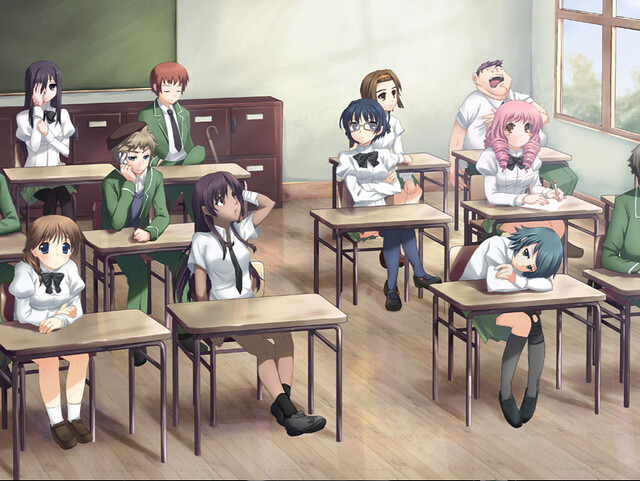
“Everyone wants someone there to pull them up, out of their self-pity.” -Hisao Nakai
Katawa Shoujo is a visual novel that takes place at a school for the disabled. The game’s protagonist, Hisao, arrives there reluctantly after a long hospital stay for life-threatening arrhythmia (irregular heartbeat). His first episode occurred when a girl at his school confessed to him, setting the tone of heartbreak, isolation, and the difficulty of human connection for the game. Thus the game’s logo, a yellow heart criss-crossed with bandages: wounded and frightened.
This is a relationship/dating sim game, but it is closer in feel to Evangelion than any of the “harem” anime and manga (Tenchi Muyo, Love Hina) that it may seem, on casual inspection, to resemble. Each of the girls that Hisao can wind up falling in love with at Yamaku Academy has a different disability, and that, combined with the fact that there is (semi-)explicit sex in this game, is the reason some people have dismissed it, unplayed, as a fetish-fest.
Katawa Shoujo
By: Derek Yu
On: January 28th, 2012
Katawa Shoujo (lit. “Cripple Girls”) is a visual novel that was developed by Four Leaf Studios, an “international team of amateur developers”. Based on a sketch by doujinshi Raita Honjou (who’s also the character artist for Valkyria Chronicles), the game takes place in a high school for disabled teenagers. 4 years in development, Katawa Shoujo was released early this year and the team disbanded soon after.
I haven’t played it, but most of the comment threads about the game seem to start with someone wondering out loud whether it’s as perverted and exploitative as it sounds, to be answered by fans who claim the subject matter is treated tastefully and that the actual sex, which is minimal, takes a backseat to the development of the characters and their relationships.
IFComp 2011 Entries Now Available
By: Derek Yu
On: October 4th, 2011
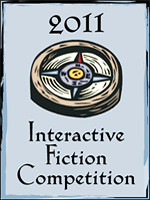
Judging has begun for this year’s Interactive Fiction Competition, with 38 entries available for play, either online or as downloadable files. You can also download every entry in a big package. Voting, which is open to anyone, lasts until November 15th.
Emily Short is writing short summaries of all the (non-broken) entries on her website.
Don’t Take It Personally, Babe…
By: Derek Yu
On: April 12th, 2011
Don’t Take It Personally, Babe, It Just Ain’t Your Story is a Ren’Py visual novel by Christine Love, and the spiritual sequel to Digital: A Love Story. Set in the year 2027, the novel takes place in a high school literature class and is about “the erosion of privacy, gay drama, young sexuality, and the perils of modern online life”. You play a young teacher who, unbeknownst to his seven new students, has access to all of their online communication.
Andrew Plotkin Wants to Write IF Fulltime and You Can Help
By: Derek Yu
On: November 1st, 2010
For fans of interactive fiction, the name Andrew “Zarf” Plotkin should be familiar. Plotkin has been in the scene for over a decade and has not only developed some of the genre’s most beloved games (Spider and Web, Shade), but has also made a number of important technical contributions to IF, including the Blorb archive format and the Glulx virtual machine. Up until now, however, he’s only pursued IF as a hobby. That’s about to change!
With his upcoming project, Hadean Lands, Plotkin would like to make the leap into fulltime IF development. The Kickstarter page for Hadean Lands has already surpassed its goal of $8000 after the first day, but the more the merrier, obviously. Donors can get some fun stuff, like a limited edition or their name in game. Plus, you know, you’ll be supporting the growth of the inspiring IF community.
A very early demo of the game is available to play here, in your web browser. The commercial version of the game will be released on iPhone/iPad for $5.
(Source: george, via TIGForums)
TIGdb: Entry for Andrew Plotkin
Pick Up the Phone Booth and Aisle
By: Guest Reviewer
On: February 23rd, 2010
[This is a guest article by Valter. If you’d like to contribute a guest article to TIGSource, go here.]
Pick Up the Phone Booth and Aisle is a parody of text-based adventure games. (Specifically, it’s a parody of Pick Up the Phone Booth and Die. -ed.) The premise is simple: You are standing in the center of a non-descript New England town. A phone booth is near you. What do you do? >
The catch to this game is that the game ends after one command – every single command possible in the game will give you an “ending” (with a very small number of exceptions, which merely restart you automatically). A lot of time was given into writing endings for every bizarre thing you can think of! (You could think of it as taking the Scribblenauts approach to adventure gaming).
Finding endings can be a bit difficult, as certain “obvious” results like “use phone booth” do not work, whereas obscure entries such as “fry phone booth” have endings. Apart from that, though, it’s an excellent way to spend 10-20 if you’re bored. There are “over 200 endings”, as boasted by the authors, and they’re all comedic. The majority of the endings I found were capable of eliciting at least a dry chuckle, some were given a hearty chortle, and I must admit that a few led to some honest-to-goodness guffawing. Give it a shot!
Walker & Silhouette
By: Guest Reviewer
On: January 30th, 2010
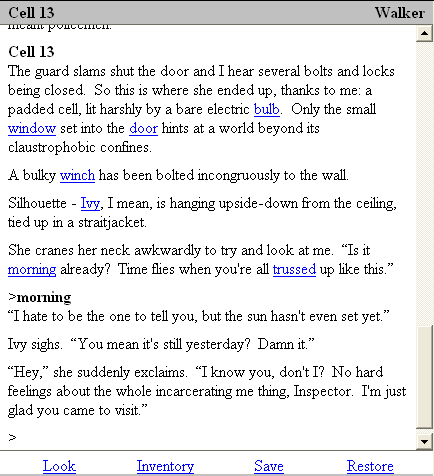
[This is a guest review by William Broom. If you’re interested in writing an article for TIGSource, please go here.]
Walker & Silhouette is an interactive fiction by Pacian, creator of Dead Like Ants and Gun Mute, among others. His latest game is set in a fantastical steampunk world and follows the two titular characters on a brief but enjoyable adventure.
In Gun Mute, Pacian made his game more accessible to those unfamiliar with Interactive Fiction by removing most of the directional keywords: Instead of east, west, north and south, the player only had to deal with forward and back. In Walker & Silhouette, he has taken this one step further by highlighting all the keywords within the text. Although you can still type them in if you want to, it’s easier to simply click on the highlighted word. This system (which Pacian acknowledges as being derived from Blue Lacuna) makes the game very accessible and fluid. Moreover, when you’re stuck on a puzzle, it’s nice to know that you have all the pieces in front of you, not hidden away somewhere.
Ultimately, though, this kind of neat gimmick would mean nothing if the story itself were not up to scratch, and fortunately Pacian delivers on this front. His writing is frequently witty and amusing, with the banter between the two characters being his greatest strength. On the other hand, telling the story from both characters’ perspectives gives them a little more depth than your standard comedy duo. The puzzles, though few in number, are enjoyable and intuitive. You’re unlikely to feel frustrated at any point in the game, but IF veterans may find it a little too easy.
The only criticism that I could level against the game is that it’s too short – about 20-30 minutes playtime at the most. This isn’t really a problem in itself, especially as Pacian has said that he is considering extending the story with a series of episodic sequels. However, the story in this first ‘episode’ is a bit too big to fit into the small space provided, resulting in a slightly rushed feeling toward the end. But this is only a small blot on an otherwise charming and memorable little game.
Alabaster
By: Derek Yu
On: June 16th, 2009
Alabaster is a new interactive fiction game from Emily Short and various other authors that takes place in the world of Snow White. In the game you’ve been asked by the Queen to execute Snow White in the woods and bring back her heart in a box. Snow White, however, has another plan. Now that you’re out in the woods and alone with Snow White, which of the two women do you trust?
There’s a lot in this game to be interested in, starting with the game’s dark fairy tale setting and the themes that the game touches upon throughout the course of your conversation with Snow White. Secondly, there is the conversation system itself – it’s designed by Short, who laid out some of the concepts behind the system in her article about conversation in games. Alabaster also utilizes simple procedural illustration to lend a little more depth to the story without showing up the player’s imagination.
Finally, the creation of the game was rather unique in and of itself – although Emily Short wrote the introduction of the game, the conversation pieces, or “quips” were written by numerous contributors (John Cater, Rob Dubbin, Eric Eve, Elizabeth Heller, Jayzee, Kazuki Mishima, Sarah Morayati, Mark Musante, Adam Thornton, and Ziv Wities) and then tied together stylistically at the end of the development. The result is 18 different endings and over 400 quips, many of which have alternate versions, depending on the situation. The entire conversation tree is available for download, along with the game’s source code.
But is the game a success? Well, my early impressions of the game is very favorable. The story and writing are, naturally, very good. I love the idea of unraveling characters through conversation and the way you must use this information to ultimately make a decision to trust one person or another. Short’s conversation system is adequately complex, too, although the recurring problem in IF games – namely, how do I phrase what I want to say so that the interpreter understands it – is there. Conversational hints and the “CHANGE THE SUBJECT” action are very useful, but I’m still slightly resentful of them (they can be turned up or down). Still, this system is a step forward from the other (admittedly few) IF games I’ve played, and the story is well-worth following through.
TIGdb: Entry for Alabaster
